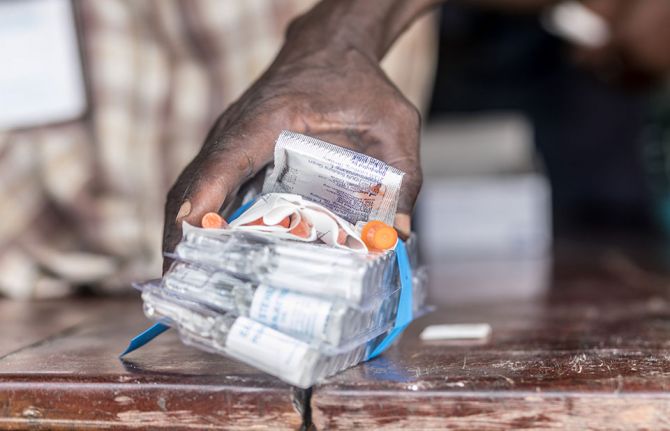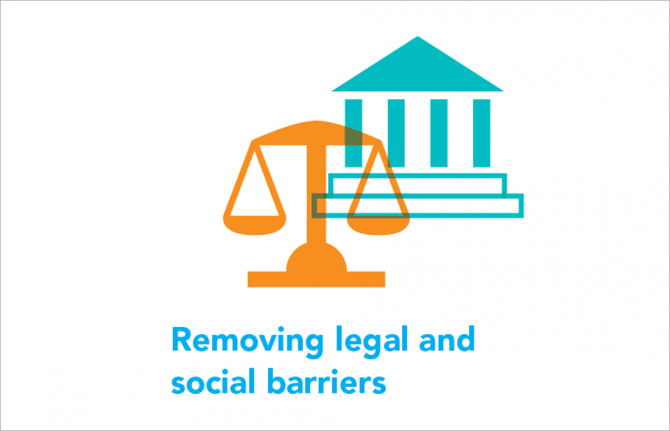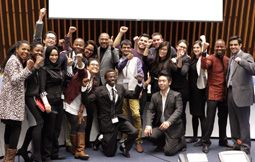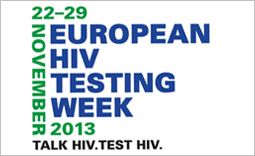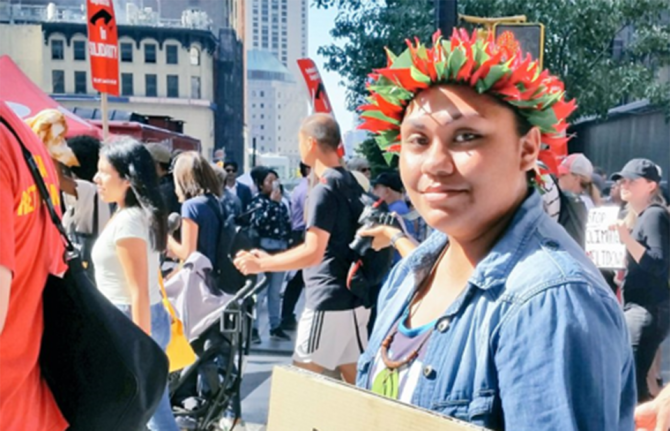
Feature Story
UN Secretary-General applauds the removal of entry restrictions based on HIV status by United States of America and Republic of Korea
04 January 2010
04 January 2010 04 January 2010
Map of countries, territories and areas that have some form of HIV-related restrictions on entry, stay or residence.
UNAIDS strongly welcomes the elimination of travel restrictions based on HIV status by the Republic of Korea, effective 1 January 2010. It also commends the United States for full implementation of the final rule that removes entry restrictions which means that travellers living with HIV can freely enter the United States of America as of today.
United Nations Secretary-General Ban Ki-moon congratulated President Lee Myung-bak on the Republic of Korea’s decision. “I applaud President Lee for his country’s leadership in ending restrictions towards people living with HIV that have no public health benefit,” said Secretary-General Ban Ki-moon.
I repeat my call to all other countries with such discriminatory restrictions to take steps to remove them at the earliest.
Ban Ki-moon, UN Secretary-General
“I repeat my call to all other countries with such discriminatory restrictions to take steps to remove them at the earliest.”
The Secretary-General also congratulated President Barack Obama when the US policy change was announced in October 2009. Today's removal of HIV-related entry, stay and residence restrictions, or "travel ban" as it was known, in the United States overturns a policy that had been in place since 1987.
UNAIDS Executive Director Michel Sidibé also hailed the United States and the Republic of Korea for ending entry restrictions towards people living with HIV, calling the policy changes "a victory for human rights on two sides of the globe."
I call for global freedom of movement for people living with HIV in 2010, the year when countries have committed to achieve universal access to HIV prevention, treatment, care and support.
Michel Sidibé, Executive Director of UNAIDS
"I call for global freedom of movement for people living with HIV in 2010, the year when countries have committed to achieve universal access to HIV prevention, treatment, care and support," said UNAIDS Executive Director Michel Sidibé.
"Let no country obstruct someone because of their HIV status. Such discrimination has no place in today's highly mobile world," Mr Sidibé continued.
Some 57 countries, territories and areas have some form of HIV-specific restriction on entry, stay and residence that is based on HIV status. These include those that completely ban entry of HIV positive people for any reason or length of stay; and/or are applied to visa applications for very short stays (e.g. tourist visas); and/or are applied to visa applications for longer stays (visas for residency, immigration, asylum or resettlement, study, international employment, and consular service). Such restrictions, strongly opposed by UNAIDS, are discriminatory and do not protect public health.
UN Secretary-General applauds the removal of entr
Press centre:
Download press release (4 January 2010)
UN Secretary-General urges countries to follow the United States and lift travel restrictions for people living with HIV (31 October 2009)
Contact:
UNAIDS Secretariat Geneva:
Edward Mishaud
Tel. +41 22 791 5587
E-mail: mishaude@unaids.org
UNAIDS Washington DC:
Gregory Smiley
Tel. + 1 202 2237610
E-mail: smileyg@unaids.org
Publications:
Mapping of restrictions on the entry, stay and residence of people living with HIV (pdf, 177 Kb.)
Related

Feature Story
HIV prevention among most-at-risk young people: How to get the message across
28 December 2009
28 December 2009 28 December 2009
photo caption. Credit:
It is critical that young people most-at-risk of HIV infection are better informed and equipped with skills to protect themselves. This was a key argument emerging from an international symposium convened to address the education sector’s response to the challenge of HIV among this key population.
Held in Berlin in early December, the meeting of the UNAIDS Inter-agency Task Team (IATT) on Education was hosted by German Technical Cooperation (GTZ) on behalf of the German Federal Ministry for Economic Cooperation and Development (BMZ). It brought together some 70 experts from around the world to discuss concrete ways forward to reach, with prevention messages, the most vulnerable young people already engaging in high-risk behaviour, such as multiple partnerships, inter-generational sex, unprotected male-to-male sex, sex work or injecting drug use.
Young people in general are especially vulnerable to the virus. According to the UNAIDS 2009 AIDS Epidemic Update, those aged 15-24 account for 40% of all new infections. This is exacerbated by the fact that only 40% of young people in the same age group have accurate knowledge about HIV and transmission. Helping youth avoid infection is seen as crucial for social and economic development, and providing them with AIDS-related knowledge and skills is a central concern of the UNAIDS IATT on Education.
Reaching those who have never been to school or who have dropped out early and left the formal education sector represents a particular challenge and the symposium examined a range of possible approaches to reach vulnerable adolescents and youth both in and out of school, looking at specifically targeted responses.
Ishita Chaudhry from the YP Foundation in India noted that while sexuality was a fundamental component of being human there was a failure to get basic information to young people to help protect them from HIV infection. “Why is sexuality so problematic?” she asked.
According to Dr Robert Carr, the Associate Director of the International Council of AIDS Service Organizations (ICASO) and keynote speaker, young people are too often “left to fend for themselves”, receiving inadequate preparation for their sexual and reproductive lives.
Fear, stigma and discrimination, laws and policies were identified as barriers to meeting the needs of those most vulnerable and ensuring their involvement in developing and implementing interventions. According to Els Klinkert, Senior Policy Adviser at UNAIDS, the “most-at-risk young people in low and concentrated epidemics are largely invisible”. This notion of invisibility was also invoked by Dr. Carr referring to gay and bisexual youth in the Caribbean. “Hidden behaviours” and limited frank discussions about these behaviours were seen to be problematic.
Symposium participants were able to review existing data on education sector approaches to HIV prevention; exchange ideas and experiences; and develop recommendations for outreach strategies that target young people in inclusive and gender-sensitive ways.
The sector was seen to play a role in multiple aspects of the response for most-at-risk young people. It was noted, firstly, that schools often extend farther into many communities than most public services – and have the potential to reach children and young people before they engage in most-at-risk behaviours. Secondly, good quality education that focuses on empowerment within safe and protective environments has a sustained impact on reducing vulnerability and behaviours that create, increase or perpetuate risk. Thirdly, comprehensive sexuality education – which addresses sexual and reproductive health, human rights, HIV prevention, gender, drugs and other aspects – was seen to equip learners with the necessary knowledge and skills to make informed decisions.
There was a shared understanding that young people should be at the heart of HIV programming, not just as passive recipients of information and services but as involved actors and that this is critical when developing and implementing HIV interventions. The statement issued by youth representatives at the meeting reinforced this point: “We demand the meaningful involvement of diverse youth communities, especially young people living with HIV as they are the key role models and leaders in the movement…We young people are here living, working, and ready to take responsibility along with your support and mentorship. We are not future leaders, we are leaders of today.”
Empowering young people to protect themselves from HIV is one of the nine priority focus areas for UNAIDS and its Cosponsors under the Joint action for results: UNAIDS outcome framework 2009-2011.
Formed in 2002, the IATT on Education is convened by UNESCO and brings together UNAIDS Cosponsors, bilateral agencies, private donors and civil society partners with the purpose of accelerating and improving a coordinated and harmonised education sector response to HIV.
HIV prevention among most-at-risk young people: H
Cosponsors:
Feature stories:
Education sector: Getting to grips with an HIV monitoring and evaluation framework (23 November 2009)
More needs to be done to help young people most at risk of HIV infection (10 August 2009)
UNAIDS Task Team develops effective tools to help young people tackle HIV (05 June 2009)
Publications:
A Strategic Approach: HIV & AIDS and Education UNAIDS IATT on Education, 2008 (pdf, 2.44 Mb.)
Toolkit for Mainstreaming HIV and AIDS in the Education Sector: Guidelines for Development Cooperation Agencies. (UNAIDS IATT on Education, 2008) (pdf, 1.01Mb.)
UNAIDS Outcome Framework 2009-11 (pdf, 396 Kb.)
Related

Feature Story
UNAIDS in action: Highlights from 2009
23 December 2009
23 December 2009 23 December 2009Below are some of the highlights and key events which took place in 2009.
DECEMBER |
| Sexuality education an imperative for children and young people in a world affected by AIDS | |
 | In many parts of the world, a combination of social taboos, unavailability of sound information, lack of resources and infrastructure leave many young people vulnerable to coercion, abuse, exploitation, unintended pregnancy and sexually transmitted infections, including HIV. Sexuality education can play a key role in improving knowledge and reducing sexual risk behaviours among young people. - Thu, 10 Dec 2009 |
| Michel Sidibé calls for prevention revolution in opening address at UNAIDS’ governing body meeting | |
 | The 25th meeting of the Programme Coordinating Board (PCB) of UNAIDS opened today in Geneva. Key agenda items include the recently completed Second Independent Evaluation of UNAIDS 2002-2008 and the anticipated impact that the financial crises on the AIDS response. - Tue, 08 Dec 2009 |
| HIV cannot be managed in isolation”: Pacific Commission on AIDS | |
 | An independent Commission on AIDS in the Pacific recommends that HIV cannot be managed in isolation; it should be considered in the overall development context of the region. This is one of several recommendations stemming from the report that was launched today by UN Secretary-General Ban Ki-moon at the United Nations in New York. - Wed, 02 Dec 2009 |
| President Zuma and UNAIDS Executive Director call for mass prevention movement at World AIDS Day commemoration in Pretoria | |
 | To mark World AIDS Day, UNAIDS Executive Director Mr Michel Sidibé joined President Jacob Zuma and South Africans in their national commemoration in Pretoria where he called for the forging of a mass prevention movement. - Tue, 01 Dec 2009 More
|
| Second Independent Evaluation of UNAIDS | |
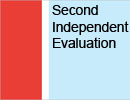 | The outcomes of the Second Independent Evaluation of UNAIDS came before the 25th UNAIDS Programme Coordinating board (PCB) meeting in December 2009 with the presentation of reports from the Oversight Committee and the Evaluation Team as well as a written response from UNAIDS. The evaluation was a 20 month long process to reassess priorities, build on achievements, and determine how UNAIDS can best position the United Nations response to AIDS. Consultations were held in countries and at headquarters with Member States, UNAIDS Secretariat, Cosponsors and civil society. The PCB reviewed the findings as well as UNAIDS’s response and took decisions on next steps which will now see the implementation over the next 18 months of some 24 recommendations. |
NOVEMBER |
| New HIV recommendations to improve health, reduce infections and save lives | |
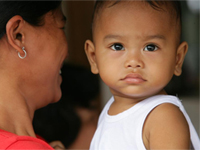 | On the eve of World AIDS Day, the World Health Organization (WHO) is releasing new recommendations on treatment, prevention and infant feeding in the context of HIV, based on the latest scientific evidence. - Mon, 30 Nov 2009 |
| Michel Sidibé meets with Li Keqiang, Vice Premiere of China | |
 | Mr Michel Sidibé, UNAIDS Executive Director, met with Vice Premiere of the People’s Republic of China Li Keqiang in Beijing during his week long visit to the country. - Fri, 27 Nov 2009. |
| UNAIDS Outlook 2010: Fresh perspective on the AIDS epidemic and response | |
 | It’s clear that the HIV epidemic the world faces today is not the same as when it peaked in 1996. The number of people living with HIV globally is now at 33.4 million and although 2.7 million people became newly infected with HIV in 2008, good news is that this is a decrease by 17% over the last eight years. - Tue, 24 Nov 2009. |
| Eight-year trend shows new HIV infections down by 17%—most progress seen in sub-Saharan Africa | |
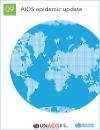 | Efforts towards universal access to HIV prevention, treatment, care and support are bringing AIDS out of isolation. - According to new data in the 2009 AIDS epidemic update, new HIV infections have been reduced by 17% over the past eight years. - Tue, 24 Nov 2009 |
| Violence against women and HIV | |
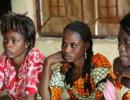 | Numerous studies from around the globe confirm the links between violence against women and HIV. These studies show that women living with HIV are more likely to have experienced violence, and that, women who have experienced violence are more likely to have HIV infection. - Tue, 10 Nov 2009 |
OCTOBER |
| UN Secretary-General urges countries to follow the United States and lift travel restrictions for people living with HIV | |
 | Geneva/New York, 31 October 2009 — UNAIDS welcomes President Obama’s announcement of the final rule removing entry restrictions based on HIV status from US policy. The removal of HIV-related travel restrictions in the US overturns a policy that had been in place since 1987. Such restrictions, strongly opposed by UNAIDS, are discriminatory and do not protect public health. - Sat, 31 Oct 2009 |
| Michel Sidibé urges India to continue AIDS effort | |
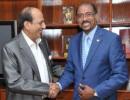 | In his first visit to India as Executive Director of UNAIDS, Michel Sidibé has held a series of meetings with the Government in which he emphasized the role of political leadership to ensure that the country’s universal access goals to HIV prevention, care and treatment are achieved in India by 20. - Tue, 06 Oct 2009 |
SEPTEMBER |
| More than four million HIV-positive people now receiving life-saving treatment | |
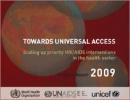 | More than 4 million people in low- and middle-income countries were receiving antiretroviral therapy (ART) at the close of 2008, representing a 36% increase in one year and a ten-fold increase over five years, according to a new report released today by the World Health Organization (WHO), the United Nations Children's Fund (UNICEF) and the Joint United Nations Programme on HIV/AIDS (UNAIDS). - Wed, 30 Sep 2009 |
| Jeux de la Francophonie and UNAIDS: Partnering for young people | |
 | The Jeux de la Francophonie, the Francophone Games, have been opened in Beirut by His Excellency Michel Suleiman, the President of Lebanon. UNAIDS is an official partner to the games where sport and culture combine to foster dialogue and understanding among French speaking nations. - Mon, 28 Sep 2009 |
| UNAIDS partners in new Clinton Global Initiative to address sexual violence against girls | |
 | UNAIDS and cosponsors UNICEF, UNFPA and WHO have joined the Centers for Disease Control and Prevention, UNIFEM and private sector supporters through the Clinton Global Initiative to address the injustices and health impact of sexual violence against girls. The initiative, launched in New York by the partners, will focus on countries where sexual violence is a key initiation point for the spread of HIV and other infectious diseases. - Fri, 25 Sep 2009 |
| Largest ever HIV vaccine trial results very encouraging | |
 | Geneva, 24 September 2009 – The World Health Organization (WHO) and the Joint United Nations Programme on HIV/AIDS (UNAIDS) are optimistic about the results, announced today, of the largest ever HIV vaccine clinical trial held to date. - Thu, 24 Sep 2009 |
| Bruni-Sarkozy endorses UNAIDS call to virtually eliminate mother-to-child HIV transmission by 2015 | |
 | Carla Bruni-Sarkozy echoed UNAIDS call to virtually eliminate mother-to-child HIV transmission by 2015 while addressing the UN Secretary General Ban Ki-moon and leaders at a side event to the opening of the United Nations General Assembly in New York. - Wed, 23 Sep 2009 |
| UNAIDS, Millennium Villages join forces to keep children free from HIV in Africa | |
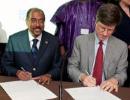 | UNAIDS and the Millennium Villages Project signed an agreement in New York to strengthen efforts to eliminate mother-to-child transmission of HIV in Africa. The aim of the partnership is to help local governments create “Mother to child transmission-free zones” in 14 ‘Millennium Villages’ across ten African countries. - Mon, 21 Sep 2009 |
AUGUST |
| "Empowering People, Strengthening Networks" — 9th ICAAP opens | |
 | The President of the Republic of Indonesia, H.E. Hj. Dr Susilo Bambang Yudhoyono has officially opened the 9th International Congress on AIDS in Asia and the Pacific (ICAAP), which this year takes place in Bali, Indonesia from 9-13 August under the theme “Empowering people, strengthening networks”. - Sun, 09 Aug 2009 |
JULY |
| Landmark Delhi High Court decision recognizes inappropriate criminalization as a barrier to health, human rights and dignity | |
 | The Delhi High Court declared section 377 of the Indian Penal Code which criminalised consensual sexual acts of adults in private as violative of the rights to privacy, liberty, health and equality enshrined in the Constitution of India. Though the decision was largely seen as a victory for the men who sex with men and transgender people, it is a victory for all – regardless of sexual orientation and gender identity. The judgment is noteworthy and progressive in terms of its rejection of a hete - Tue, 07 Jul 2009 |
JUNE |
| 24th UNAIDS Board meeting opens with a focus on “people on the move” | |
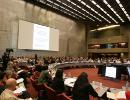 | UNAIDS Governing body, the Programme Coordinating Board (PCB), is holding its 24th meeting in Geneva from 22-24 June 2009. This year’s thematic session is focusing on addressing the HIV-related needs of “people on the move”. Mr Michel Sidibé will also give his first address to the Board members in the role of UNAIDS Executive Director. - Mon, 22 Jun 2009 |
| General Assembly review on HIV/AIDS | |
 | As the HIV response represents one of the soundest of all possible global investments, it is critical that commitment to HIV efforts be maintained and strengthened in the midst of these economic challenges - Report of the Secretary-General to the 63rd General Assembly. - Tue, 16 Jun 2009 |
| 2009 HIV/AIDS Implementers' Meeting | |
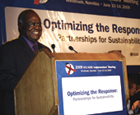 | From June 10-14, more than 1,500 implementers from around the world will gather in Windhoek to share best practices and lessons learned during the implementation of multi-sectoral AIDS programs with a focus on optimizing the impact of prevention, treatment and care programs; enhancing program quality; promoting coordination among partners; and encouraging innovative responses. - Wed, 10 Jun 2009 |
MAY |
| UN Secretary-General meets HIV positive UN staff members | |
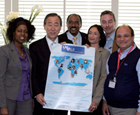 | The United Nations Secretary-General Mr Ban Ki-moon held a meeting in Geneva with HIV positive UN staff members. The staff are part of a UN system-wide advocacy group called UN Plus which was set up in 2005 to promote the rights of HIV-positive staff and provide peer support. - Wed, 20 May 2009 |
| New same sex and transgender Action Framework | |
 | A new UNAIDS Action Framework on Universal Access for Men who have Sex with Men and for Transgender People sets out how UNAIDS will facilitate and support universal access to HIV prevention, treatment, care and support for men who have sex with men and transgender people. Read more. - Fri, 15 May 2009 |
| UNAIDS reaffirms its partnership with Global Fund as board meeting concludes | |
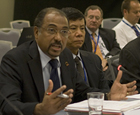 | The 19th Board Meeting of the Global Fund to Fight AIDS, Tuberculosis and Malaria concluded yesterday in Geneva, Switzerland. Opening a technical session on AIDS earlier today UNAIDS Executive Director Michel Sidibé reaffirmed UNAIDS commitment to its partnership and reiterated his call for a fully funded Global Fund. He called for bolder action in order to address the challenges facing the AIDS response. - Thu, 07 May 2009 |
APRIL |
| International Technical Consultation on ‘Positive Prevention’ | |
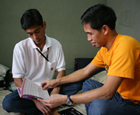 | Ever since HIV testing was developed in the early days of the epidemic, the role of people living with HIV in HIV prevention has been an important aspect of the AIDS response. Following the advent of combination antiretroviral treatment which significantly prolongs life and improves quality of life for people living with HIV, there have been increasing calls to incorporate what is known as ‘positive prevention’ in the continuum of prevention and care programmes and services. - Mon, 27 Apr 2009 |
| Consultation held on de?nition and measurement of concurrent sexual partnerships | |
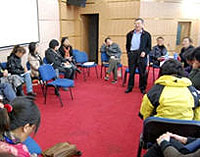 | It has long been suggested that concurrent sexual partnerships are one component responsible for creating sexual contact networks conducive to the rapid spread of HIV. On 20-21 April 2009, the UNAIDS Reference Group on Estimates, Modelling, and Projections convened a meeting to discuss the de?nition and measurement of concurrent sexual partnerships in Nairobi, Kenya. - Fri, 24 Apr 2009 |
| Joint action for results: UNAIDS outcome framework, 2009 – 2011 | |
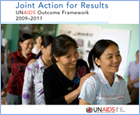 | The HIV organizational landscape has evolved and grown more complex over the past decade. UNAIDS, donors and civil society, including networks of people living with HIV, have rightly demanded greater clarity on the relationships between needs, financing, activities and outcomes. Also demanded is greater specificity about the role of UNAIDS and the Secretariat within the wider constellation of actors. - Wed, 22 Apr 2009 |
MARCH |
| TB/HIV, universal access, and human rights key items on UNAIDS Executive Director’s agenda in Brazil | |
 | The Executive Director of UNAIDS, Mr Michel Sidibé, is in Brazil this week promoting greater awareness of the interlinked epidemics of HIV and tuberculosis, universal access to HIV services for all people in need, and the necessity to address stigma and discrimination in Brazil’s response to HIV. - Tue, 24 Mar 2009. |
| OPINION: Silence on harm reduction not an option | |
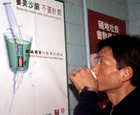 | In 1998, the UN General Assembly held a Special Session on the world drug problem. At the time there was little discussion on the linkage between HIV and drugs. Today of the estimated 16 million people world wide who inject drugs—3 million are HIV positive. Any discussion on drugs cannot ignore their needs and human rights. - Wed, 11 Mar 2009 |
FEBRUARY |
| New report calls for $25 billion investment to ensure countries reach 2010 targets | |
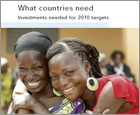 | A new report released by UNAIDS, What countries need: Investments needed for 2010 targets estimates that an investment of US$ 25 billion will be required for the global AIDS response in 2010 for low- and middle-income countries—US$ 11.3 billion more than is available today. - Tue, 10 Feb 2009 |
| Visiting Khayelitsha, Executive Director announces universal access as top priority for UNAIDS | |
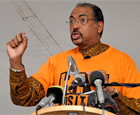 | This morning the Executive Director of UNAIDS, Mr Michel Sidibé gave his first major global statement at a public meeting in Khayelitsha a township on the outskirts of Cape Town in South Africa. - Tue, 10 Feb 2009. |
JANUARY |
| New head of UNAIDS Michel Sidibé sworn in by UN Secretary-General | |
 | Michel Sidibé was sworn in as new Executive Director of the Joint United Nations Programme on HIV/AIDS (UNAIDS) by Secretary-General Ban Ki-moon at UN Headquarters in New York yesterday. - Fri, 23 Jan 2009 |
Related

Feature Story
AIDSspace.org: Supporting the global AIDS response through social networking
18 December 2009
18 December 2009 18 December 2009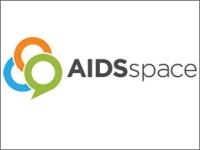
AIDSspace.org was launched on 24 November and will fulfil UNAIDS’ vision of an online community for the 33.4 million people living with HIV and the millions who are part of the AIDS response. AIDSspace.org was created to expand both informal and established networks to help maximize resources for a stronger response to the epidemic.
Modelled on popular social networks such as Facebook and Twitter, which have shown the potential of online word-of-mouth movements, AIDSspace.org fills the gap for an accessible and shared platform for the global AIDS community.
Through sharing the vast knowledge and experience out there, from the community organizations doing excellent work but do not have the resources to maintain a website to the PHD student wanting to publish their thesis, I know AIDSspace can bring us all together and will contribute towards a more cohesive and well informed AIDS response .
Michel Sidibé, Executive Director of UNAIDS
The site is built on three key principles: Connect, Share and Access. Through AIDSspace, members can meet and connect with other members to learn from their work, exchange ideas and discover new networks; post and share key policies, best practices, multimedia materials, reports and other essential resources; as well as access and post jobs, consultancies, requests for proposals, as well as reviews on service providers.
Since the beginning of the HIV epidemic, individuals, organizations, universities and government bodies have produced invaluable knowledge but most materials have remained separate on individual organization’s web sites or in databases.

In applying a community content-generated approach, it is hoped that AIDSspace will capture this extensive knowledge and make information available to expand the reach and effectiveness of HIV professionals.
Speaking at UNAIDS’ governing body meeting earlier in December, the Executive Director of UNAIDS, Mr Michel Sidibé, underlined the important role of AIDSspace in supporting the work of individuals and organizations working on HIV.
“Through sharing the vast knowledge and experience out there, from the community organizations doing excellent work but do not have the resources to maintain a website to the PHD student wanting to publish their thesis, I know AIDSspace can bring us all together and will contribute towards a more cohesive and well informed AIDS response,” he said.
Currently in testing mode, or Beta, AIDSspace is building its foundation of users, but has already been effective at disseminating reports and documents, building connections across the globe and organizing activists.
The AIDSspace team hopes to improve the site to meet the needs of the global AIDS community, including the creation of multilingual platforms. Through using the best information technology tools, the ambition of AIDSspace is assist the AIDS and broader development communities to make their work go even further.
AIDSspace.org: Supporting the global AIDS respons
Partners:
Press centre:
Eight-year trend shows new HIV infections down by 17%—most progress seen in sub-Saharan Africa
Speeches:
Mobilizing Prevention as a movement for Universal Access (pdf, 360 Kb.)
Feature stories:
AIDS Epidemic Update 2009
UNAIDS Outlook 2010: Fresh perspective on the AIDS epidemic and response (24 Nov 2009)
Contact:
Edward Mishaud
Communications
E-mail: mishaude@unaids.org
Related
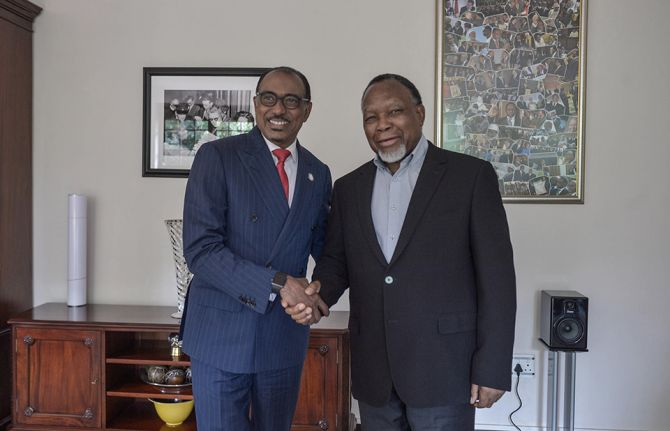 Keeping up the momentum in the global AIDS response
Keeping up the momentum in the global AIDS response

24 April 2019
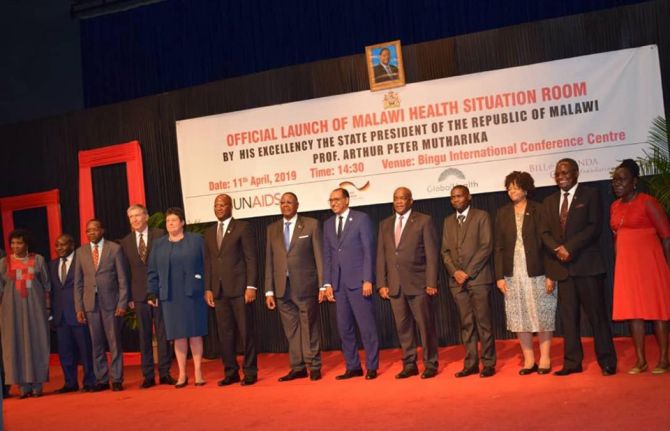 Malawi launches its health situation room
Malawi launches its health situation room

12 April 2019
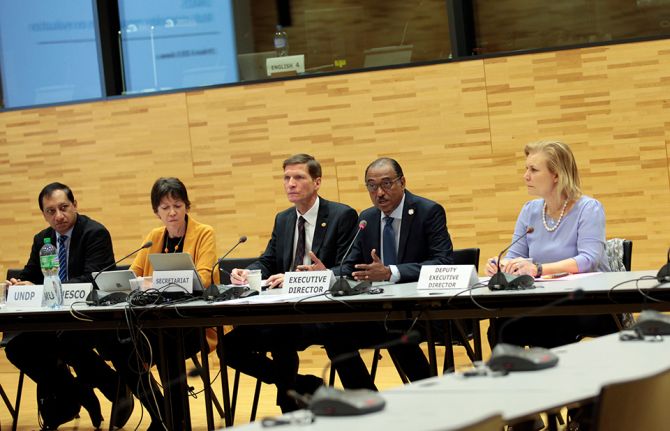 Learning lessons on evaluation
Learning lessons on evaluation

02 April 2019

Feature Story
South African Muppet Kami speaks the language of acceptance
17 December 2009
17 December 2009 17 December 2009
Sesame Street fans across the world are celebrating the 40th anniversary of the popular children’s television programme this year. In South Africa, the programme’s local version called Takalani Sesame is revelling in the popularity of its mustard-coloured furry Muppet, Kami, who is openly living in HIV.
Sesame Street originated in the United States and has since adapted to fit the culture and needs of the 140 countries where it has been exported. In South Africa, too, where an estimated 5.7 million people live with HIV the inclusion of the character Kami who is HIV-positive aims to counter stigma and discrimination through creating awareness and addressing fears and misconceptions about HIV.
The introduction of Kami, which means “acceptance” in the South African language Setswana, is an effort by the South African government to bring to the fore issues related to HIV. Kami was created at the behest of the South African government, which sponsors the show, in an effort to change perceptions of people living with HIV through edu-tainment
Takalani Sesame is the most ambitious project outside the US . No other country version has pushed at the boundaries of the United States model quite as much as South Africa.
Gloria Britain, head of the Muppet Workshop Project Office in Johannesburg
On the show, Kami is a five-year-old orphan whose mother died of AIDS. Part of her character’s role is to destigmatise those living with HIV, and to open discussion about sensitive issues including coping with illness and bereavement.
Talking about the Kami, Takalani Sesame producer Naila Farouky says, “Her whole intention is that she lives positively despite the fact that she has this virus.”
The idea of an HIV-positive Muppet began to take shape early in 2002, when Sesame Workshop and South African partners met in South Africa and New York to discuss their commitment to addressing the HIV issue on the show.
Since September 2002, Kami has helped dispel the culture of silence that prevents so many South Africans from seeking and receiving care for their illness. “Sometimes when you’re ill, you mustn’t keep it a secret, you must tell people,” Kami says in one episode.
“Takalani Sesame is the most ambitious project outside the US,” says Gloria Britain, who heads the Project Office in Johannesburg. “No other country version has pushed at the boundaries of the United States model quite as much as South Africa.”
Although prevalence of HIV along people below the age of 20 in South Africa has been declining significantly, an estimated 280,000 children still live with HIV in the country and up to one million have been orphaned by the epidemic.
HIV prevalence among children aged two and older also varies by province, with the Western Cape (3.8%) and Northern Cape (5.9%) being least affected, and Mpumulanga (15.4%) and KwaZulu-Natal (15.8%) at the upper end of the scale.
HIV in South Africa is transmitted predominantly heterosexually between couples, with mother-to-child transmission being the other main mode of transmission.
Incorporating all 11 of South Africa’s official languages into its scripts, Takalani Sesame is seen by an estimated half-million kids a week. Its audience is pre-school children aged between three and seven years and their caregivers. As 30% of homes in South Africa do not have television, a radio version of the programme and an outreach initiative have also been launched.
Sesame Street runs through 140 countries, is broadcast in over 30 different languages, and provides the foundation for a truly powerful educational programme that directly addresses the challenging issues of global awareness and appreciation.
South African Muppet Kami speaks the language of
Key populations:
External links:
Publications:
Getting the message across: the mass media and the response to AIDS (pdf, 891 Kb.)
Media and HIV/AIDS : making a difference (pdf, 1.09 Mb.)
Related

Feature Story
Now the time to act to address climate change: Government and UN leaders gather in Copenhagen
15 December 2009
15 December 2009 15 December 2009The UN climate change summit taking place in Copenhagen marks a global effort to forge a new deal to curb climate change. Secretary-General Ban Ki-moon warned that the world stood at the crossroads between a sustainable future and a path to catastrophe. “Now is the moment to act,” he told a news conference at United Nations Headquarters in New York.
“Seldom in history has a choice been so clear. We can move toward a future of sustainable green growth, or we can continue down the road to ruin. We can act on climate change now, or we can leave it to our children and grandchildren – a debt that can never be paid, that threatens our planet and its people,” he added.
Around 15,000 participants from 192 countries representing governments, UN participants, the business community, and civil society have gathered for the largest international political conference ever held in Denmark.
The final high-level segment of the summit will begin this evening and is due to be attended by around 120 heads of state and government and UN Secretary-General Ban Ki-moon.
The Secretary-General will host a breakfast meeting tomorrow for United Nations system heads. UNAIDS Executive Director Michel Sidibé will be in attendance and will also participate in the High-level Chief Executive Board side event later in the day.
Any meaningful response to climate change must involve a strong participation by civil society and other key stakeholders, including the private sector, working hand-in-hand with national health authorities and the United Nations.
Just as the AIDS response requires all partners from governments to civil society and the private sector to work together—so must we work together to reach goals in addressing climate change.
UNAIDS Executive Director Michel Sidibé
“Just as the AIDS response requires all partners from governments to civil society and the private sector to work together—so must we work together to reach goals in addressing climate change,” said Mr Michel Sidibé.
The partnerships of the AIDS response can serve as models for the types of response that will be required in adapting to climate change-related health, social and economic development challenges.
The response to climate change must ensure that the countries and communities that are most threatened are at the core of all thinking and planning. In the case of AIDS, it was the most affected communities—represented by civil society—that were able to generate the social engagement that galvanized political support, increased financing, improved accountability and tailored specific responses.
During the quest to tackle climate change, much can be learned from the solutions derived by the AIDS response as it has confronted crises and often transformed societies in the process.
Now the time to act to address climate change: Go
Press centre:
It’s now or never in bid to curb climate change, Ban warns (14 December 2009)
UN Leading by Example: Greenhouse Gas Inventory Achieved—Challenge Now To Cut Back Emissions (15 December 2009)
Speeches:
Opening remarks to the United Nations Climate Change Summit Plenary, General Assembly by Secretary-General Ban Ki-moon (22 September 2009)
Feature stories:
Examining links between AIDS and climate change (07 July 2008)
External links:
United Nations Climate change Conference web site
UN Worldwide Campaign on Climate Change
Gateway to the UN System’s Work on Climate Change
Publications:
Climate change and AIDS: A joint working paper
Summary report of the technical meeting on AIDS and climate change
Moving towards a climate neutral UN (UNEP)
Related
 Keeping up the momentum in the global AIDS response
Keeping up the momentum in the global AIDS response

24 April 2019
 Malawi launches its health situation room
Malawi launches its health situation room

12 April 2019

Feature Story
Eminent African Jurists discuss HIV and the law
14 December 2009
14 December 2009 14 December 2009Some 30 judges from the highest national and regional courts from 15 countries in sub-Saharan Africa met in South Africa on 10-12 December to discuss the role of the judiciary in the AIDS response.
The meeting, convened by the Joint United Nations Programme on HIV/AIDS together with the United Nations Development Programme, the International Association of Women Judges and the International Commission of Jurists included discussions around the latest scientific and juridical developments relevant to the legal response to HIV. In addition to the judges, participants included people living with HIV, representatives of sex workers and men who have sex with men, members of regional parliamentary institutions and non-governmental organisations working on HIV and the law in the region.
The meeting was also convened to respond to concerns that national law and law enforcement across the African continent do not consistently protect people most at risk of HIV infection and those living with HIV.
Across Africa, laws exist today that fuel discrimination, prevent effective national responses to HIV and violate human rights.
UNAIDS Executive Director, Michel Sidibé
“Across Africa, laws exist today that f uel discrimination, prevent effective national responses to HIV and violate human rights,” said Michel Sidibé, Executive Director of UNAIDS who delivered the keynote address at the meeting. “Countries must use their legal systems to protect people most vulnerable to HIV and ensure they have access to essential HIV services.”
During the meeting the judges agreed upon a statement of principles aimed at guiding and inspiring members of the judiciary throughout Africa in the context of the epidemic. The statement of principles addresses the following issues: i) the role of the law in responding to the HIV epidemic; ii) Science and evidence-informed decision making; iii) stigma and discrimination; iv) protecting and empowering women: the links between HIV, gender based violence and property rights; v) protecting and empowering marginalised and criminalised communities; vi) ensuring proper application of criminal law; and vii) court proceedings and access to justice.
Over the past 25 years, knowledge about HIV and how to prevent and treat it has evolved significantly within scientific, medical, epidemiological, social and economic disciplines and many important HIV related human rights and legal commitments have been made. However, national law and law enforcement have not always kept pace with these developments and in some cases have even worked against them.
Judges have a key role to play in ensuring that the rights of people living with and vulnerable to HIV are upheld.
Justice Georgina T. Wood, Chief Justice of Ghana
Some interpretation of the law relevant to HIV is still based on outdated paradigms that were formed prior to the availability of HIV treatment which has enabled people living to lead long and productive lives. Recent studies also demonstrate that the risk of transmission is considerably reduced if people living with HIV are following a correct and consistent antiretroviral treatment regimen and do not have other sexually transmitted diseases.
Of particular concern is the recent trend in Africa towards the overly broad criminalisation of HIV transmission and exposure and over the criminalisation of people most affected by HIV, such as men who have sex with men, sex workers, and people who use drugs.
“Criminalisation is radically incompatible with a public health strategy that seeks to encourage people to come forward to find out their HIV status,” said Justice Cameron, a Judge on the Constitutional Court of South Africa.
On a positive note, in some countries, jurisprudence relating to HIV has had a transformative and beneficial impact on the national AIDS response and on public perception of HIV. This includes judgments that declare that discrimination in employment, access to education, medical insurance is unlawful, as well as those that assert the rights to confidentiality and access to medicines for all including prisoners.
At the meeting, participants further discussed the importance of the leadership role of the judiciary in upholding human rights for all, filing against bad laws, ensuring access to the courts for the most vulnerable and giving meaning to constitutional protection in peoples’ everyday lives.
Justice Georgina T. Wood, Chief Justice of Ghana stressed that, “Judges have a key role to play in ensuring that the rights of people living with and vulnerable to HIV are upheld.”
Eminent African Jurists discuss HIV and the law
Cosponsors:
Partners:
International Association of Women Judges
International Commission of Jurists
Press centre:
Press Release: Eminent African Jurists discuss HIV and the law (14 Dec 2009)
Laws that criminalize groups and behaviours threaten to jeopardize universal access to HIV prevention, treatment, care and support (01 Dec 2009)
Experts call for strengthened legal services to fight HIV discrimination in Asia Pacific (08 Aug 2009)
Speeches:
Michel Sidibé, Executive Director of UNAIDS: Jurists, Justice and AIDS
Feature stories:
Experts call for strengthened legal services to fight HIV discrimination in Asia Pacific (08 Aug 2009)
Landmark Delhi High Court decision recognizes inappropriate criminalization as a barrier to health, human rights and dignity (07 July 2009)
Contact:
Chiara Frisone
Tel. +27 11 517 1515
Tel. +27 828 804 729
E-mail:
frisonec@unaids.org
Publications:
Statement on Criminalization of HIV Transmission and Exposure (pdf, 270 Kb.)
Related

Feature Story
UNAIDS Goodwill Ambassador, Her Serene Highness Princess Stephanie of Monaco visits the frontline of the HIV epidemic in South Africa
14 December 2009
14 December 2009 14 December 2009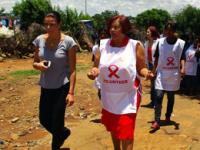
UNAIDS Goodwill Ambassador, Her Serene Highness, Princess Stephanie of Monaco meets with community organizations and partners in South Africa, December 2009.
Credit: F. Nebinger
Visiting South Africa for the first time in her role as a UNAIDS Goodwill Ambassador, Her Serene Highness, Princess Stephanie of Monaco met with community organizations and partners at the forefront of South Africa’s response to the HIV epidemic. South Africa has one of the largest HIV epidemics, with an estimated 5.7 million people living with HIV.
I am touched to see that people living with HIV in South Africa are getting access to the prevention and treatment services that enable them to live with hope and dignity.
Her Serene Highness, Princess Stephanie of Monaco
“I am touched to see that people living with HIV in South Africa are getting access to the prevention and treatment services that enable them to live with hope and dignity,” said Princess Stephanie.
During her visit, Princess Stephanie met with the UNAIDS Executive Director Mr. Michel Sidibé who was in South Africa to address a meeting of African Jurists on HIV and the Law. The Princess shared with Mr. Sidibe on her vivid impressions of her country visit and her experience of interacting with civil society organizations and people living with HIV in the South African townships.
“Princess Stephanie’s support for people living with HIV is a testament to her commitment to the AIDS responce" said Mr. Sidibé. “UNAIDS is honoured to have Princess Stephanie as our Goodwill Ambassador.”

UNAIDS Goodwill Ambassador, Her Serene Highness, Princess Stephanie of Monaco and UNAIDS Executive Director Mr. Michel Sidibé, in South Africa. December 2009.
Credit: N. Saussier-FAM
On her arrival, the Consulate of Monaco and UNAIDS hosted a reception for the Princess with organizations of people living with HIV. The United Nations Resident Coordinator, Dr. Agostinho Zacarias welcomed the Princess to South Africa and said that her high profile visit will increase the visibility of South Africa’s progress in response to the epidemic. He added that the United Nations is inspired by the commitment of the Princess to support people living with HIV, an example which will be used to strengthen UN Plus in South Africa, the UN group for staff living with HIV.
Vuyiseka Dubula, General Secretary of the Treatment Action Campaign explained to the Princess that organizations in South Africa are working hard to ensure that South Africa’s Constitution, which protects and promotes the human rights of people living with HIV, is translated into action at the local level. Ms. Dubula participated in the conference for people living with HIV in Monaco organized by Princess Stephanie in 2008.
Princess Stephanie’s support for people living with HIV is a testament to her commitment to the AIDS response.
Michel Sidibé, UNAIDS Executive Director
Princess Stephanie visited inner city Hillbrow and the townships of Alexandra and Kliptown, all of which are facing the challenges of high levels of unemployment and poor access to basic health services coupled with high HIV prevalence.
During the visit to the civil society group Friends for Life in Alexandra township, Princess Stephanie met with children living with HIV who have lost their parents to AIDS and are now receiving treatment, care and support.
In the Kliptown Township in Soweto, Princess Stephanie was hosted by the community organization Persevere Until Something Happens (PUSH), an AIDS Consortium affiliate. The AIDS Consortium supports a 1000-strong affiliate network of AIDS Service Organizations and individuals providing training, advocacy, libraries, cyber cafés that is building AIDS competent communities across South Africa.
She also visited the Reproductive Health and Research Unit (RHRU), an acclaimed research unit of the University of Witwatersrand and a World Health Organization collaborating centre. She also visited the Hillbrow Health Precinct, including a tour of the ARV clinic, one of South Africa’s largest ARV provision programmes with more than 6000 patients on antiretroviral treatment.
During a visit to the Nelson Mandela Foundation, Princess Stephanie met with Ms. Graça Machel, wife of former President Mandela.
Her Serene Highness Princess Stephanie of Monaco has served as Goodwill Ambassador for the Joint United Nations Programme on HIV/AIDS (UNAIDS) since October 2006. She is well known for her passionate engagement in AIDS issues, and has served as President of Fight AIDS Monaco since 2004. Fight AIDS Monaco offers information, HIV prevention and support to people living with and affected by HIV.
UNAIDS Goodwill Ambassador, Her Serene Highness P
Press centre:
H.S.H. Princess of Monaco accepts appointment as UNAIDS Special Representative (06 October 2006)
Feature stories:
HSH Princess Stephanie inaugurates new premises of Fight AIDS Monaco (20 June 2008)
HIV positive leaders meet in Monaco (25 January 2008)
Princess Stephanie of Monaco visits Madagascar (09 November 2007)
UNAIDS Special Representative HSH Princess Stephanie of Monaco leads creative AIDS fundraising activities (07 December 2006)
Multimedia:
External links:
Related

Feature Story
Peru: New campaign to counter stigma and discrimination towards people living with HIV
11 December 2009
11 December 2009 11 December 2009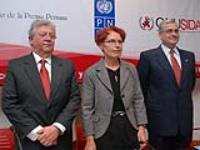 Luis Agois President of the Peruvian Press Council, Renate Ehmer, UNAIDS Coordinator for Peru, Ecuador and Bolivia and Jorge Chediek, Resident Representative of the UN system at the launch of the new campaign.
Luis Agois President of the Peruvian Press Council, Renate Ehmer, UNAIDS Coordinator for Peru, Ecuador and Bolivia and Jorge Chediek, Resident Representative of the UN system at the launch of the new campaign. Credit: UNAIDS/UNDP/CPP
In Peru, 76 000 people are living with HIV. While HIV prevalence in the general population is relatively low at 0.5%, the men who have sex with men and the transgender communities have been hard hit by the epidemic with an estimated prevalence of 10.8% and 32% respectively.
A range of complex social prejudices result in people living with the HIV being frequently subject to discrimination in the workplace and in wider society.
To counter stigma towards people living with HIV in Peru a new campaign was launched in November 2009; a joint initiative by UNAIDS, UNDP and the Peruvian Press Council.
The purpose of the multimedia campaign, entitled “An image against stigma and discrimination caused by HIV and AIDS”, is to create a supportive environment for people living with HIV, free of discrimination and fear.
Estimates by civil society organizations reveal that an increasing number of hate crimes are taking place every year, most of which go unpunished.
Renate Ehmer, UNAIDS Coordinator for Peru, Ecuador and Bolivia
Speaking at the launch, the President of the Peruvian Press Council Luis Agois noted the role media can play. “Our contribution is the broadcasting of this campaign, an initiative which has been enthusiastically joined by the press in general in Peru.”
Fear of social repercussions and the discrimination that might result from a positive HIV test, many Peruvians avoid leaning their HIV status according to Jorge Chediek, Resident Representative of the UN system, further jeopardizing their health. “As a consequence, they can’t access treatment; and HIV treatment in Peru is free.”
Renate Ehmer, UNAIDS Coordinator for Peru, Ecuador and Bolivia highlighted the extreme expressions of stigma and discriminations that result in violence, “hate crimes; when men and women are killed because of their sexual orientation or gender identity.”
“Estimates by civil society organizations reveal that an increasing number of hate crimes are taking place every year, most of which go unpunished,” Ms Ehmer continued.
The campaign brings together Peruvian celebrities and people living with HIV who appear on posters and brochures and distributed nation-wide.
The high profile participants include Javier Velasquez Quesquen, Head of the Cabinet of Ministers; Javier Villa Stein, President of the Judiciary; Oscar Ugarte, Minister of Health; Jose Antonio Garcia Belaunde, Minister of Foreign Affairs; Antonio Brack, Minister of Environment; Monsignor Bambaren, Nolberto Solano, football players, members of the music group Grupo 5 and comedian Carlos Alvarez as well as Economist Hernando de Soto.
Two short films have also been produced as part of the campaign and can be watched here:
An image against stigma and discrimination caused by HIV and AIDS vol 1
An image against stigma and discrimination caused by HIV and AIDS vol 2
Peru: New campaign to counter stigma and discrimi
Cosponsors:
Multimedia:
An image against stigma and discrimination caused by HIV and AIDS vol 1
An image against stigma and discrimination caused by HIV and AIDS vol 2
Feature stories:
Developing indicators on HIV-related stigma and discrimination (30 November 2009)
United Kingdom rollout The People Living with HIV Stigma Index (30 November 2009)
Publications:
Reducing HIV Stigma and Discrimination: a critical part of national AIDS programmes (pdf, 598 Kb)
HIV-related Stigma, Discrimination and Human Rights Violations. Case Studies of successful programmes (pdf, 1 Mb)

Feature Story
Human Rights Day - Partnering with men to stop human rights violations against women
10 December 2009
10 December 2009 10 December 2009A version of this story was first published at www.unfpa.org
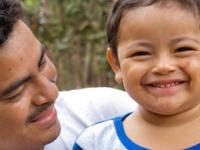
This portrait of father and son from El Salvador is one of 38 images depicting positive images in the “Influential Men photography exhibit”
Credit: David Isaksson
It should have been one of the happiest nights of their lives. A young soldier and his new wife were alone for the first time on their wedding night. Much to the husband’s surprise, there was no blood after they consummated the marriage. They knew the kind of danger this result could bring if anyone found out. Elder women from the village would want to see the sheets, and if there was no blood, the young bride could be hurt, or even killed, for tarnishing her family’s honour.
It is not women or men working alone to end gender-based violence that yields the best results. Rather, it is the partnerships between them that have the greatest impact and reach.
Thea Fierens, UNFPA regional director for Eastern Europe and Central Asia
But several months earlier, the soldier had participated in a training session on sexual and reproductive health, gender equality and the prevention of gender-based violence. He learned that a woman can be a virgin and not bleed during intercourse, and that there may be more to a woman’s honour than her virginity. The soldier cut his finger and let it bleed onto the sheets to save his wife from danger.
The soldier reported this story to the trainers, and it trickled up to the leadership in the Ministry of Health, the Turkish Armed Forces and the United Nations Population Fund (UNFPA). It has stayed with them as a reminder that just one day of education can change – and perhaps save – a person’s life.
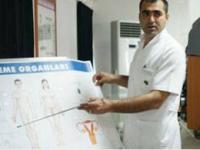
Comprehensive training on reproductive health for the Turkish Armed Forces is one of the programmes described in the new publication, Partnering with men to end gender-based violence
Credit Nezih Tavlas
The training session was part of an ambitious effort to educate every young man in Turkey on the importance of sexual and reproductive health, gender equality and the prevention of gender-based violence. It was organized by UNFPA, in partnership with the Ministry of Health and the Turkish Armed Forces.
With no formal curriculum in schools on sexual health, the training was the first time many soldiers learned how to use a condom or gave thought to gender-based violence. To date, 3 million men have been trained, and the project has been made permanent by a decree from the Turkish Armed Forces. Many of the soldiers say the training changed their beliefs about a woman’s right to make her own choices and to live free from violence.
The story is from one of five case studies featured in a new UNFPA publication, Partnering with Men to End Gender-based Violence: Practices that work from Eastern Europe and Central Asia. Other studies document experience in working with non-governmental organisations in the Ukraine, communities in Armenia, institutions in Romania and police officers in Turkey. The studies provide a step-by-step analysis of how projects to address gender-based violence were carried out and the process through which they were implemented.

“If there is one key lesson to be learned from these case studies, it is the value of partnership between men and women,” says Thea Fierens, UNFPA regional director for Eastern Europe and Central Asia. “It is not women or men working alone to end gender-based violence that yields the best results. Rather, it is the partnerships between them that have the greatest impact and reach. Each case study, in its own way, exemplifies this point, and provides a portal – even if only a small one – into what a world free from violence would look like.”
For UNAIDS stopping violence against women and girls is an issue of major concern and has been highlighted as one of nine priority areas outlined in the UNAIDS Outcome Framework 2009-11.
Alongside the featured publication, UNFPA has commissioned an exhibition of photographs, entitled ‘Influential men’, which highlights the power of positive male role models. It aims to raise awareness of the importance of including and engaging men and boys in creating a world in which every individual is treated with dignity and respect.
Click here to view a photo gallery of the exhibition.
Human Rights Day - Partnering with men to stop hu
Cosponsors:
Press centre:
Feature stories:
UNFPA report: Exploring links between HIV and climate change (18 November 2009)
Violence against women and HIV (10 November 2009)
Empowering women to protect themselves: Promoting the female condom in Zimbabwe (29 October 2009)
UNAIDS partners in new Clinton Global Initiative to address sexual violence against girls (25 September 2009)
Commission on the Status of Women opens with call for action to achieve universal access and gender equality (02 March 2009)
Challenging violence against women a key task for newly launched Caribbean Coalition on Women, Girls and AIDS (06 March 2009)
Publications:
Partnering with Men to End Gender-based Violence: Practices that work from Eastern Europe and Central Asia (pdf, 1.75 Mb.)
Women and Health: Today’s Evidence, Tomorrow’s Agenda
UNAIDS Outcome framework 2009-11 (pdf, 396 Kb.)
2008 Delegates Guide to Women and AIDS: All Women, All Rights (pdf, 506 Kb.)
An Analysis of the Gender Policies of the Three Major AIDS Financing Institutions: The Global Fund to Fight AIDS, Tuberculosis and Malaria, the World Bank and the President’s Emergency Plan for AIDS Relief (July 2008) (pdf, 150 kb)


